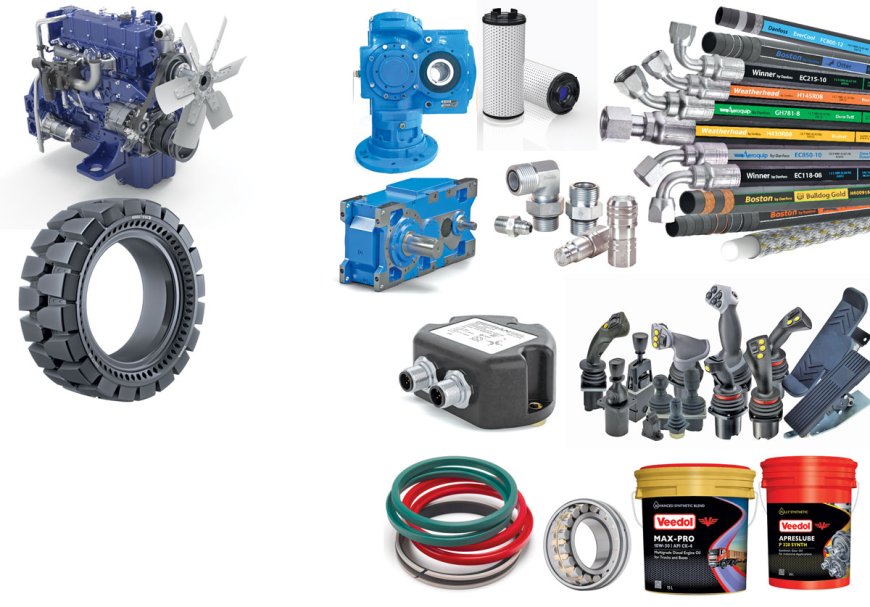ON THE GREENER SIDE!

The construction equipment industry is experiencing a transformative shift towards sustainability, driven by the global imperative to address climate change and environmental degradation. This “Green Revolution” is not only reshaping the design and functionality of construction machinery but also revolutionizing the components, accessories, and spares that make up these complex systems of the heavy machines. Manufacturers are at the forefront of this movement, introducing innovative solutions that enhance efficiency, reduce emissions, and promote eco-friendly practices.
Equipment Times explores the innovative components, accessories and spares driving the green revolution in the construction equipment industry.
The construction industry has been a significant contributor to environmental pollution, with heavy machinery often being associated with high emissions and fuel consumption. However, the growing awareness of environmental issues and stringent regulatory standards have catalysed a paradigm shift. Today, manufacturers of construction equipment components are prioritizing sustainability in their research and development (R&D) efforts, aiming to create products that not only meet but exceed environmental standards.
Electric and Hybrid Powertrains
The transition from traditional diesel engines to electric and hybrid powertrains represents one of the most significant advancements in the construction equipment industry. Electric motors and hybrid systems offer substantial reductions in greenhouse gas emissions and operational noise. Companies are investing heavily in developing batteries with higher energy densities and faster charging capabilities, ensuring that electric construction equipment can operate efficiently on par with their diesel counterparts.
Hydraulic Systems and Efficiency
Hydraulic systems are the backbone of many construction machines, and innovations in this area have led to significant improvements in efficiency and performance. Advanced hydraulic fluids with lower viscosity reduce energy losses, while electronically controlled hydraulic systems optimize power usage. These enhancements not only improve the efficiency of the equipment but also extend the life of the components, reducing the need for frequent replacements and minimizing waste.
Advanced Materials and Lightweight Components
The use of advanced materials such as high-strength steel, carbon fiber composites, and aluminum alloys is revolutionizing the design of construction equipment. These materials offer superior strength-to-weight ratios, allowing manufacturers to produce lighter and more fuel-efficient machines. Additionally, the development of durable and recyclable materials contributes to the overall sustainability of the equipment.
Smart Technologies and Telematics
The integration of smart technologies and telematics systems is enhancing the operational efficiency and environmental performance of construction equipment. Real-time monitoring of machine performance and health through telematics enables proactive maintenance, reducing downtime and extending the lifespan of components. Furthermore, data analytics and IoT (Internet of Things) connectivity allow for optimized fuel consumption and emissions control, ensuring that machines operate within eco-friendly parameters.
Eco-friendly Lubricants and Fluids
The development of biodegradable lubricants and fluids is a significant step towards reducing the environmental impact of construction equipment. These eco-friendly products minimize soil and water contamination in case of leaks and spills. Manufacturers are also focusing on extending the service intervals of these fluids, thereby reducing the frequency of replacements and the generation of hazardous waste.
Recycled and Recyclable Spare Parts
The circular economy model is gaining traction in the construction equipment industry, with manufacturers increasingly using recycled materials in the production of spare parts. Components made from recycled metals and plastics not only reduce the demand for virgin raw materials but also help in managing industrial waste. Additionally, designing spare parts that are easily recyclable at the end of their life cycle contributes to sustainable practices.
Energy-efficient Accessories
Accessories such as LED lighting systems and energy-efficient HVAC (Heating, Ventilation, and Air Conditioning) units are becoming standard in modern construction equipment. These accessories consume less power, thereby reducing the overall energy footprint of the machinery. Moreover, the implementation of solar panels and other renewable energy sources for powering auxiliary functions is a testament to the industry’s commitment to sustainability.
Collaborative Efforts and Industry Standards
The Green Revolution in the construction equipment industry is not an isolated endeavor but a collaborative effort involving manufacturers, regulatory bodies, and industry associations. Standards and certifications such as ISO 14001 for environmental management systems are guiding manufacturers in their sustainability initiatives. Industry collaborations and partnerships are fostering the exchange of knowledge and best practices, accelerating the adoption of green technologies.
The Road Ahead
As the construction equipment industry continues to embrace the Green Revolution, the focus on sustainability will only intensify. Future advancements are likely to include the widespread adoption of hydrogen fuel cells, further miniaturization and efficiency of electric components, and the integration of artificial intelligence for smarter, more efficient machine operations. The commitment of manufacturers to innovation and sustainability will play a pivotal role in shaping a greener, more sustainable future for the construction industry.
The Green Revolution in the construction equipment industry is a testament to the power of innovation and collaboration in addressing some of the most pressing environmental challenges of our time. Manufacturers of components, accessories, and spares are leading the way with ground-breaking technologies and sustainable practices that not only enhance the performance and efficiency of construction equipment but also contribute to a healthier planet. As this revolution gains momentum, the construction industry is set to become a model of sustainability and environmental stewardship for other sectors to follow.
Industry speaks…

Arijit Basu, Managing Director, Tide Water Oil Co (India), said, “The current technology trends for Veedol products in the infrastructure equipment sector emphasize enhanced performance, sustainability, and efficiency. Fully synthetic lubricants, such as Veedol Apreslube P Synth, offer superior performance under heavy load and extreme temperatures, significantly reducing friction and wear. This extends equipment lifespan and ensures reliability in high-performance machinery and critical components. Sustainability is prioritized through environmentally friendly lubricants with extended drain intervals, which decrease oil change frequency, lower maintenance costs, and reduce environmental waste. High-performance hydraulic fluids like Veedol Avalon HVI ZF Pro (Zinc-free) and Avalon HVI Pro (long life multigrade hydraulic oil) improve hydraulic system efficiency, providing superior oxidation stability, anti-wear properties, and extreme temperature performance, making them ideal for excavators, loaders, and other heavy equipment.”

Sanjay Agarwal, Managing Director, Filtrec Bharat Manufacturing, said, “At Filtrec Bharat, we are dedicated to pioneering innovations in hydraulic filtration, investing over 5% of our revenue in R&D. Our latest technologies address critical issues in hydraulic circuits, such as the entrapment of dirt and foreign particles, varnish and sludge formation, oxidation, rust, noise, rapid aging, and hydraulic oil degradation. Our advanced Anti-Varnish Media combats varnish and sludge buildup, while the Absolute Beta Spark Buster Filter eliminates ESD noise, ensuring smoother operation. The Absolute BETA H20 Filter effectively prevents oxidation and rust, extending the lifespan of hydraulic components. Additionally, our new SYN media in Absolute filtration technology extends oil and filter change intervals, significantly reducing the need for frequent maintenance and minimizing the risk of breakdowns. These innovations enhance the reliability and efficiency of hydraulic systems, safeguarding critical components like valves, cylinders, and pumps.”

Devin Gawarvala, Entrepreneurial Founder and Owner, Rubber King Tyre, said, “Rubber King has adopted several eco-friendly manufacturing practices designed to reduce energy consumption and minimize emissions. By embracing the 3R concept—Reduce, Reuse, Recycle — we actively conserve natural resources and minimize waste generation. Our commitment to environmental protection is demonstrated through continuous improvements in our processes and practices. At Rubber King, we use specialized chemicals and advanced construction techniques to extend the life of our products, ensuring they provide optimal service throughout the warranty period. Our technical sales team plays a crucial role by training and educating end users to avoid incorrect fitment and service abuse, tailored to specific applications and floor conditions. This approach boosts user confidence and dealer satisfaction, making Rubber King products highly desirable. We are dedicated to our company values, aiming to make our end users more successful by creating value for all. We work tirelessly to make their lives better and easier. By following our provided guidelines, users can significantly extend the life of their construction equipment and avoid unnecessary breakdowns.”

According to Kalpesh Desai, Managing Director, Gefran India, said, “Gefran offers a wide range of sensors and systems for off-road construction infrastructure, designed to improve safety, efficiency and productivity. The company is constantly developing new technologies and innovative products to meet the sector’s increasingly complex requirements: sensors that provide more information than the mere data required or multi-variable sensors, i.e. remotely programmable transducers with several sensors on board, or customised for specific use on customer’s vehicle are the current technological trends”

Anil Ghegade, Senior Director, Danfoss India Innovation Center, said, “The hydraulics industry, like many others, has been increasingly focusing on sustainable innovations to reduce environmental impact and improve efficiency. The world of hydraulics is rapidly evolving, driven by technological advancements and changing industrial landscapes. As we navigate toward the future, it’s essential to keep an eye on the emerging trends and predictions that will shape the hydraulic industry. Integrating electric technologies with hydraulic systems can lead to significant energy savings and reduce emissions. Electric actuators and servo-hydraulics are examples of technologies that combine the advantages of both electric and hydraulic systems.”

Sandeep Khullar, Director, India Off Highway and Commercial Vehicle, Dana India, said, “Dana offers compact and efficient drives for infrastructure equipment enhancing the overall product performance and reduced total ownership cost. Dana has a wide range of e-drives to offer in various applications like Mobile Elevated Work Platforms (Scissor and Boom Lifts), Mini-excavators, and compact asphalt tandem rollers. Dana offers its customers a localised packaged solution that we call as 4-in-1 e-Propulsion system consisting of e-Motos (low voltage & high voltage), Power electronics (Invertors), Mechanical systems (gearboxes and axles) and Thermal Management (Battery Colling, Motor and Electronic cooling systems). Dana designs and rigorously validates its products for severe applications and ensure the product reliability to meet the extreme customer and market requirements. Products are designed to work in any adverse operating conditions without jeopardising product performance and reliability.”

Amit Deokule, Director - Sales & Marketing, NORD Drivesystems, said, “Continuous improvements in product range for energy-efficient products to have improved efficiency and environment friendly performance. Like development of IE4/IE5 motors from previous IE2, IE3 motors which have higher efficiency performance and lesser environmental depletion. More focus on use of renewable energy sources in place of conventional electricity use. Renewable energy offers numerous economic, environmental, and social advantages. The main benefit of use of renewable energy is reduce carbon emissions and air pollution from energy production which ultimately lowers carbon footprint. NORD is switching from conventional energy source to Solar energy system and plant’s entire operation will be covered by solar energy. Focus on use of recyclable raw materials, this improves multiple use of same material. Recycling creates a closed-loop system where unwanted products are again use in new products. This prevents the pollution and destruction that occurs when virgin materials like trees and precious metals are extracted from the earth. Also, Packaging material is reuse for supplier’s activities.”

Gurunath Kulkarni, Vice President, Shandong Heavy industry India, said, “Engines are the prime mover and heart of any equipment, be it construction equipment, trucks and/or buses and all these are high utilization segments, which have high to very high duty cycles and high operational demands. Engines play a crucial role in increasing the productivity of these equipment in various ways. One of the most significant ways in which engines contribute to productivity is through their power output. Modern engines are designed to provide higher levels of power with greater efficiency, enabling vehicles to perform tasks more quickly and effectively. Weichai engines, which power these equipment and best-in-class products, robust & reliable and also compliant to norms. Weichai Engines design are designed & developed based on application duty cycle and considering operation modes. Also, by careful selection of Engine systems like Cooling, Air intake, Exhaust & fuel system as per site condition. These considerations enhance engine durability and reliability, ensuring optimal performance in various operating environments.”

Rajesh Premchandran, Chief Sales & Marketing Officer, NBC Bearings, said, “Bearings equipped with sensors for real-time monitoring enhance predictive maintenance, reduce downtime, and increase equipment reliability, crucial for excavators, loaders, and cranes. The use of high-performance materials and advanced coatings improves wear resistance and extends lifespan, benefiting construction and mining equipment operating under extreme conditions. A significant portion of our energy need is met through renewable energy sources such as solar and wind. We have installed solar panels across our facilities to harness clean energy and reduce reliance on non-renewable sources. We have generated over 3500 MWh of power. NBC’s low-friction bearings reduce energy consumption, enhancing fuel efficiency and lowering emissions from construction equipment. Using high-quality materials and advanced coatings, NBC bearings increase durability and reduce the frequency of replacements, minimizing waste and resource consumption. Superior design ensures reliable performance under extreme conditions, decreasing downtime and maintenance needs. This enhances operational efficiency and reduces environmental disruption.”

Himanshu Sharma, Head – Marketing and Corporate Communication, B&R Automation, said, “The integration of autonomous vehicles and equipment is triggering a major upheaval in the construction industry, which is frequently seen as one of the most conventional sectors. This technology revolution promises to lower costs, increase safety, expedite procedures, manage labour shortages and change how our cities and infrastructure are constructed. Automation arose in response to these challenges, seeking to use the escalating demands for quality, the increasingly stringent safety protocols, the potential for real-time monitoring, technology advancements, and the facilitation of information sharing between building design and operation. With recent policy changes and government laid initiatives, Green (electric) construction equipment is overtaking the age-old vehicles. The market is getting ready with green solutions to meet consumer demands. The idea of sustainable construction is becoming increasingly significant on a worldwide scale as well as in the industry. The convergence of advanced automation and integrated technologies is bringing about rapid change and innovation in the construction industry following Smart Construction guidelines to use technology for remote capabilities, thorough reporting, and reliable data. Autonomous machinery and trucks are poised to bring about a technological revolution in the construction sector. These devices have the potential to revolutionize the way we construct our environment, increase production, lower costs, and improve safety. There are still hurdles, but construction will become more automated, efficient, and sustainable in the future. It will be crucial to adopt these advances if manufacturers want to remain competitive and satisfy the rising expectations of the current world. It’s obvious that things are changing as we move forward, and automation is leading this fascinating change.”

Vasim Pradhan, Head Sales - India & International Business, Ashar Locker (India), said, “We have always believed in innovation & technology because of which our products have been in huge demand across all the minerals in the industry. We are a total solution provider which differentiates us from the rest of suppliers in India. Our dedicated R&D team has always focused on developing products that create value for our customers. Some of our flagship products like the Anti-clogging screens have been trend setter in the industry enabling our customers to operate their plants during heavy monsoons. Going forward we may come up with more advanced solutions which may bring disruption in the screening industry.”








